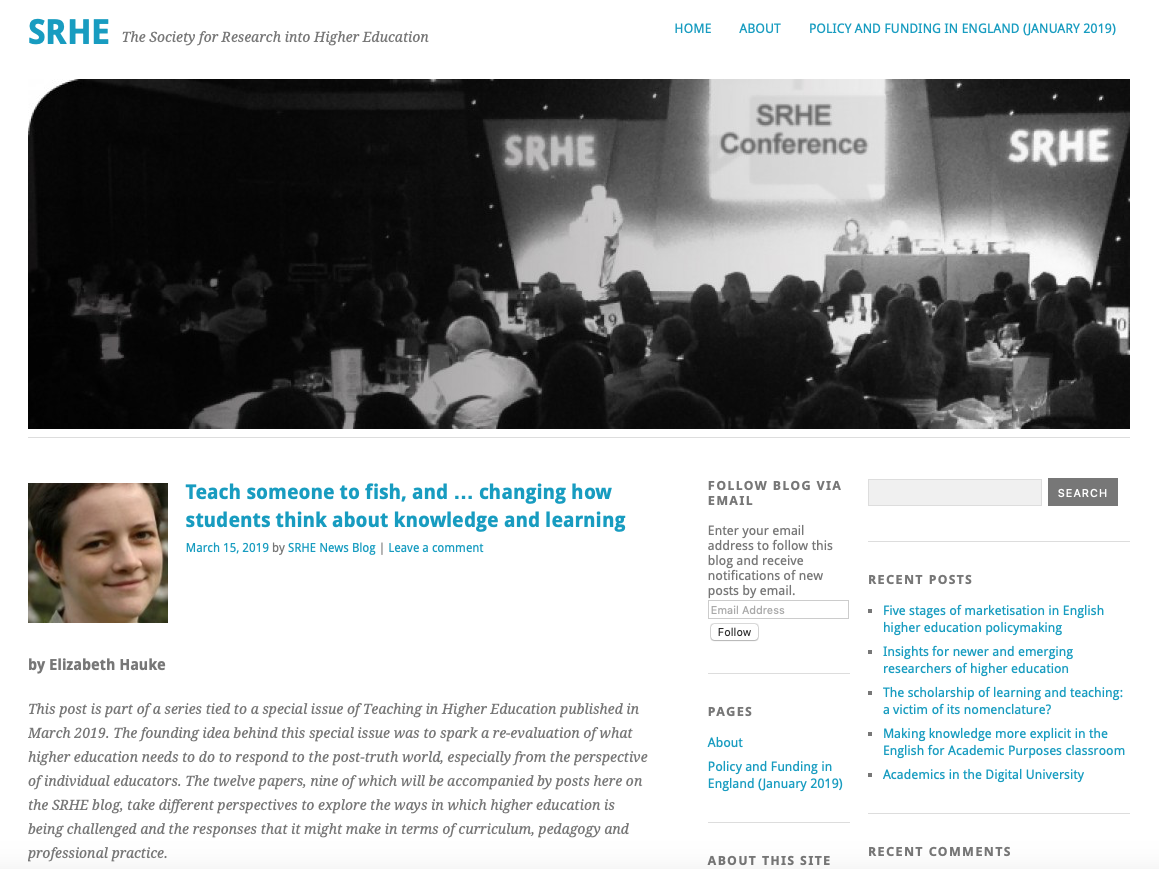This post was featured on the Society for Research in Higher Education blog in March 2019.
This post is part of a series tied to a special issue of Teaching in Higher Education published in March 2019. The founding idea behind this special issue was to spark a re-evaluation of what higher education needs to do to respond to the post-truth world, especially from the perspective of individual educators. The twelve papers, nine of which will be accompanied by posts here on the SRHE blog, take different perspectives to explore the ways in which higher education is being challenged and the responses that it might make in terms of curriculum, pedagogy and professional practice.
See on the SRHE blog.
There is a long-standing expectation that higher education will produce critical thinkers, able to tackle the big issues of the day. Criticality is tackled differently in various disciplines, and is arguably hardest to develop within traditional science and engineering education where the nature of the learning is more atomistic and cumulative. However, criticality is no less important in science and engineering graduates who are often tasked with becoming innovative problem solvers as well as big thinkers. How can these students be challenged and supported to learn in different ways and consider themselves and their growing relationship with the world around them to a create complex, integrated and dynamic ‘knowing’.
In my paper ‘Understanding the world today: the roles of knowledge and knowing in higher education’, I argue that this ‘knowing’ is a key component of knowledge – that knowledge can be thought of as a process rather than as a defined and static object to be acquired. I explore some philosophical and epistemological underpinnings of the concept of knowledge and relate these to my experience working with final year undergraduate science and engineering students taking an optional history module. The students are used to processing and memorising vast quantities of information for their disciplinary study and approach learning in quite a transactional fashion. They view knowledge as something that is held by experts, and may be bestowed upon them. It has an ethereal, almost holy quality and must not be questioned. We work hard during the module to unpack these preconceptions, and during the classes the students have to build their own knowledge of historical events by gathering evidence, information, opinion and experience and working this into a sense of knowing. As they build an understanding of a phenomenon that has occurred in the world, they must commentate on this process, recognising, reviewing and critiquing how their ‘knowledge’ is developing.
As a learning self-reflection exercise, I recently challenged the student teams to write short stories about their experience of learning on the course. I provided a story structure to help them with plot, and a list of character types to help them get started. The rules stated that the story must include all the students in their team, at least one student from another team, the teacher and someone from outside the module as characters. They could use whatever aspects of their learning experience that they felt were important to form the story.
I was fascinated to find that two of the stories featured ‘knowledge’ as a character. In one story knowledge was a princess that needed to be protected, rescued from danger and allowed to grow and develop in safety. In another, knowledge was a mysterious character that the students needed to find and befriend. This could only be achieved by tackling a number of challenges that showed the students different aspects of knowledge’s character. Once they had overcome these challenges, they were able to find and ‘live happily ever after’ with knowledge. Although these stories were simplistic and admittedly a bit tongue in cheek, they nevertheless revealed novel conceptualisations of knowledge for these students that moved beyond the explicit discussions that we had during the module.
I hope that by working with students to view knowledge as a ‘development of knowing’, a process that they can practice, master and use, they become empowered to use this criticality to inform their engagement with the wider world.
SRHE member Elizabeth Hauke is a Principal Teaching Fellow in the Centre for Languages, Culture and Communication at Imperial College, London. She specialises in research, curriculum development and teaching about interdisciplinarity and transferable skill development in higher education, specifically for STEM students. She tweets as @ehauke and @impchangemakers, can be found on Instagram as @imperialchangemakers and has a learning and teaching blog at www.livelovelearn.education.
You can find Elizabeth’s full article (‘Understanding the world today: the roles of knowledge and knowing in higher education’) here: https://www.tandfonline.com/doi/full/10.1080/13562517.2018.1544122
